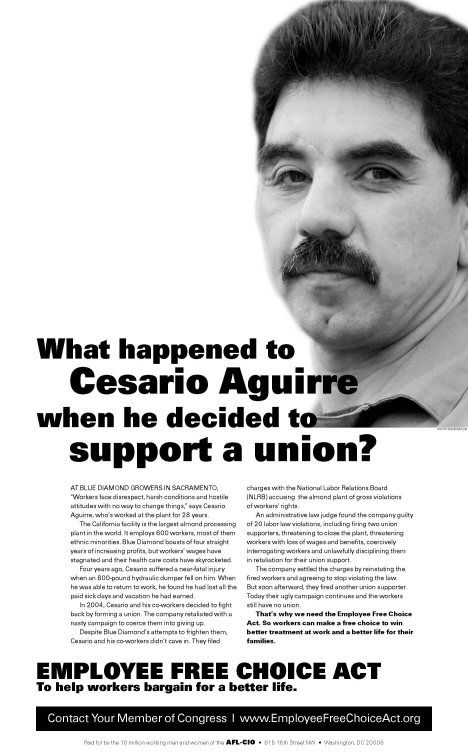EFCA would allow workers to form a union when a majority sign authorization cards, rather than holding an election. Current law already allows this “card check” process, but only if the employer opts to permit it. President-elect Barack Obama co-sponsored EFCA in Congress and pledged to promote such a bill as president, but for several outlets that’s one of the first campaign promises he should jettison, and not just because turning one’s back on traditional Democratic constituencies is a good way for Democratic politicians to earn elite journalists’ “leadership” badge.
EFCA is downright dangerous for workers because it would “strip away their right to vote in secret,” explained the Chicago Tribune (12/3/08), leaving them vulnerable to “intimidation from organizers and other workers.” USA Today (12/2/08) was also worried: “It is hard to see how ending the secret ballot would do much besides initiating campaigns of subtle, and not so subtle, intimidation as workers contemplate their decisions.” Newsweek (11/24/08) defined EFCA as “allow[ing] labor organizers to lean on workers to sign a statement demanding a union.” The Washington Post’s Michael Gerson (11/15/08) had no pity for labor complaints: “If unions cannot compete in real elections, it is the fault of unions, not the fault of elections.”
EFCA proponents dispute that the law “does away with” secret ballots, explaining that that process would still be available, along with the option of majority sign-up.
What changes is who gets to decide which process to use—the workers or their employers. What’s more, Cornell University research shows that employees are often pressured by employers to reveal their private feelings about the union during elections (“Uneasy Terrain,” 9/6/00), making the much-vaunted “secret ballot” something less than secret in practice.
But that failure to acknowledge how things actually work is a major problem with much EFCA coverage.
In Realityland, it is owners who do most of the intimidating around union formation, and do so wielding formidable tools, like the power to end a person’s livelihood.
This is not a theoretical, potential concern: A recent CEPR study (1/07) found almost one in five workers can expect to be fired for working on a union election campaign. Employers can legally “force workers to attend anti-union meetings, including ‘one-on-one conversations’ with supervisors, which happens in over 90 percent of organizing campaigns,” writes Center for American Progress’s David Madland (Politico, 7/21/08), citing Cornell research. According to the House Commit-tee on Education and Labor (3/1/07), “in 2005 alone, more than 30,000 workers received back pay from employers that illegally fired or otherwise discriminated against them for union activities.”
The increased mobility of capital has only expanded owners’ anti-union toolbox: Cornell University’s Kate Bronfenbrenner (Multinational Monitor, 3/97) found that, in the wake of NAFTA’s passage, more than 50 percent of employers used (illegal) threats of plant closings in union certification elections. One company posted maps of North America throughout the factory during an organizing effort, with an arrow pointing from the current plant site to Mexico (Extra!, 9–10/97). Where employers use such threats, unions’ success rate drops significantly. Seems like a press corps driven by concern for workplace fairness would have more to say about that.
For More Information on EFCA please visit our websites and blog
http://www.employeefreechoiceactnow.org http://efcanow.blogspot.com/ http://www.FreeChoiceActNow.Org http://www.LaborUnionResources.Org http://www.spfpa.org/UnionBusterPagemakerBrochure.pdf http://www.americanrightsatwork.org/dmdocuments/ARAWReports/UROCUEDcompressedfullreport.pdf http://findarticles.com/p/articles/mi_m1132/is_n2_v46/ai_15515998/pg_1?tag=artBody;col1

